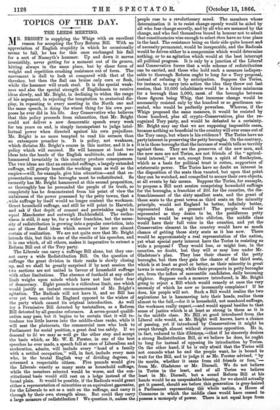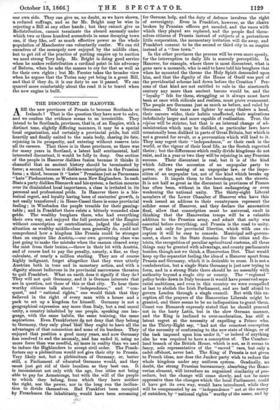TOPICS OF THE DAY.
THE LEEDS MEETING.
It JR. BRIGHT is supplying the Whigs with an excellent 1T.1 reason for accepting the Tory Reform Bill. With an appreciation of English stupidity in which he occasionally seems to fail, he has for this once exchanged his flail for a sort of Nasmyth's hammer. Up and down it moves irresistibly, never getting for a moment out of its groove, hitting always in the same place, but by sheer force of weight and repetition crushing resistance out of form. The movement is dull to look at compared with that of the thresher, but then the flail can bruise only corn or flesh, while the hammer will crush steel. It is the special weak- ness and also the special strength of Englishmen to receive ideas slowly, and Mr. Bright, in declining to widen the range of his argument, in rejecting the temptation to oratorical dis- play, in repeating to every meeting in the North one and the same speech, is doing the wisest thing for his own pur- poses he ever did in his life. Any Conservative who believes that this policy proceeds from exhaustion, that Mr. Bright could not deliver a new democratic speech every week for ten years on end, is simply incompetent to judge intel- lectual power when directed against his own prejudices. Mr. Bright is no more tempted to read his sermon than an extempore preacher is. It is policy, not weakness, which dictates Mr. Bright's course in this matter, and it is a policy which will succeed. He will hammer at least two ideas into the heads of the English multitude, and ideas so hammered invariably in this country produce consequences. The two ideas are that an extended suffrage, a largely extended suffrage, will greatly benefit the working man as well as the empire—will, for example, give him education—and that re- presentation among the boroughs must be redistributed. So earnestly has Mr. Bright hammered at this second proposition, so thoroughly has he persuaded the people of its truth, so completely has he demonstrated from his point of view the unfairness of the power possessed by the petty towns, that a . wide suffrage by itself would no longer content the workmen. Grant household suffrage, and still he will point to Harwich, and ask if that depot of cement and periwinkles ought to equal Manchester and outweigh Huddersfield. The enthu- siasm is still, it may be, for a wider franchise, but the neces- sity of redistribution is growing into a popular conviction, into one of those fixed ideas which sooner or later are almost certain of realization. We are not quite sure that Mr. Bright intends this, but this is one of the results of his speeches, and it is one which, of all others, makes it imperative to extract a Reform Bill out of the Tory party.
The Liberals can carry a suffrage Bill alone, but they can- not carry a wide Redistribution Bill. On the question of suffrage the great division in their ranks is slowly closing up, and we shall be greatly surprised if by next session the two sections are not united in favour of household suffrage with other limitations. The absence of foothold at any other limit weighs upon minds which have not lost their fear of democracy. Eight pounds is a ridiculous limit, one which would justify an instant recommencement of Mr. Bright's agitation. The Radicals will not have it, and no Bill has ever yet been carried in England opposed to the wishes of the party which caused its original introduction. As well try a Permissive Bill detested by teetotallers, as a Reform Bill detested by all genuine reformers. A seven-pound qualifi- cation may pass, but it begins to be certain that it will in- troduce too little leaven into the middle-class ranks, while it will seat the plutocrats, the commercial men who look to Parliament for social position, a great deal too safely. If we descend to 51. we may as well go the other step and accept the basis which, as Mr. W. E. Forster, in one of the best speeches he ever made, a speech full at once of Liberalism and moderation, admits, will include every "head of a family with a settled occupation," will, in fact, include every man who, in the brutal English way of dividing degrees, is esteemed a respectable citizen. Five pounds would give the Liberals exactly as many seats as household suffrage, while the members selected would be worse, and the con- stitutional basis would still rest on a ledge instead of the broad plain. It would be possible, if the Radicals would grant either a representation of minorities or an equivalent guarantee, for the Liberals to act as a unit on the suffrage, and carry it through by their own strength alone. But could they carry a large measure of redistribution f We question it, unless the people rose to a revolutionary mood. The members whose determination it is to resist change openly would be aided by all who fear change secretly, and by all who are menaced by the change, and who feel themselves bound in honour not to admit that constituencies wise enough to select them have no true place in the land. The resistance being on their side quite honest and of necessity permanent, would be insuperable, and the Radicals would be driven either to a compromise which would determine nothing, or to an agitation which would at the best interrupt all political progress. It is only by a junction of the Liberal' and Conservative forces that a wide scheme of redistribution can be earned, and those who hold such a measure indispen- sable to thorough Reform ought to long for a Tory proposal, instead of refusing it by anticipation. Suppose the Tories, for instance, to carry into action the idea they threw out last session, that 10,000 inhabitants would be a fairer minimum for a borough than 5,000,. moat of the boroughs between those figures being Whig, that immense change would be necessarily resisted only by the hundred or so gentlemen un- seated, who would be perfectly powerless. Whereas, if the Whigs proposed the same measure, it would be resisted by those hundred, plus all crypto-Conservatives, plus the re- cognized Tory party, and would be defeated to a certainty_ Mr. Bright may say that we are supposing impossible cases, because nothing so beneficial to the country will ever come out of the Tory camp, but where is his evidence ? The Tories have no. party interest in preserving the petty boroughs. On the contrary, it is in those boroughs that the increase of wealth tells so terribly against them. They are the preserves of the new men, and the new men are not Tories, are not friends of the " agricul- tural interest," are not, except from a spirit of fiunkeyism, which as a basis for political trust is rotten, supporters of aristocratic power. The Tories have no doubt an interest in the disposition of the seats thus vacated, but upon that point, they can be watched, and compelled to secure their own objects, at all events by fair means. Suppose the Tories, for example, to propose a Bill next session comprising household suffrage for the boroughs, a franchise of 201. for the counties, the dis- franchisement of the sixty smallest seats, and the grant of those seats to the great towns as third seats on the minority principle, would not England be better, infinitely better, represented than at present ? The people would be represented as they desire to be, the pestiferous petty boroughs would be swept into oblivion, the middle class, would have their full voice in the counties, and yet the Conservative element in the country would have as much chance of getting those sixty seats as it has now. There would be approximately a real representation of the nation, yet what special party interest have the Tories in resisting so. wide a proposal ? They would lose, or might lose, in the counties, no doubt, but they will or may lose under Mr. Gladstone's plan. They lose their chance of the petty boroughs, but then they gain the chance of the third seats, which is at least as good or better, as their minority in great towns is usually strong, while their prospects in petty boroughs are, from the influx of mercantile candidates, daily becoming slighter. Suppose such a measure introduced, is Mr. Bright going to reject a Bill which would remedy at once the very anomaly of which he now so incessantly complains ? If he does, his people will not. Such a Bill would realize the two aspirations he is hammering into their heads, realize them almost to the full,—for it is household, not manhood suffrage, the workmen really expect,—and would appeal besides to that sense of justice which is at least as strong in them as it is in the middle class. No Bill so good introduced from the Liberal side would, as Mr. Bright well knows, have a chance of passing, yet if introduced by Conservatives it might be swept through almost without strenuous opposition. He is, in fact, reduced to .this dilemma,—that if he sincerely desires a strong Redistribution Bill, as we believe he does, he ought to long for instead of opposing its introduction by Tories. On the other hand, if he is ' only afraid that the Tories will not concede what he and the people want, he is bound to wait for the Bill, and to judge it as Mr. Forster advised, " by its merits, whether it came from old friends or foes,"— from Mr. Gladstone or Mr. Disraeli. We do not believe in Tories in the least, and of all Tories we believe least in Mr. Disraeli, but a sound Reform Bill at his hands would be an unspeakable blessing, for we should actually get it passed, should see before. this generation is grey-haired a Parliament representing th% whole nation, a House of Commons in which the middle class would have ceased to possess a monopoly of power. There is not equal hope from
our own side. They can give us, no doubt, as we have shown, reduced suffrage, and so far Mr. Bright may be wise in rejecting a Bill at any other hands ; but they cannot give us Redistribution, cannot terminate the absurd anomaly under which two or three hundred scoundrels in some decaying town can, if they like, sell as much effective power as the whole population of Manchester can voluntarily confer. We can rid -ourselves of the monopoly now enjoyed by the middle class, but to get rid of the practice of putting empire up to auction we need strong Tory help. Mr. Bright is doing good service when he makes redistribution a cardinal point in his advocacy of Reform, when he asks the masses to cry for that as well as for their own rights ; but Mr. Forster takes the broader view when he argues that the Tories may yet bring in a great Bill, and that if they do, it is our duty to see it passed. We can quarrel more comfortably about the road it is to travel when the new engine is built.































 Previous page
Previous page